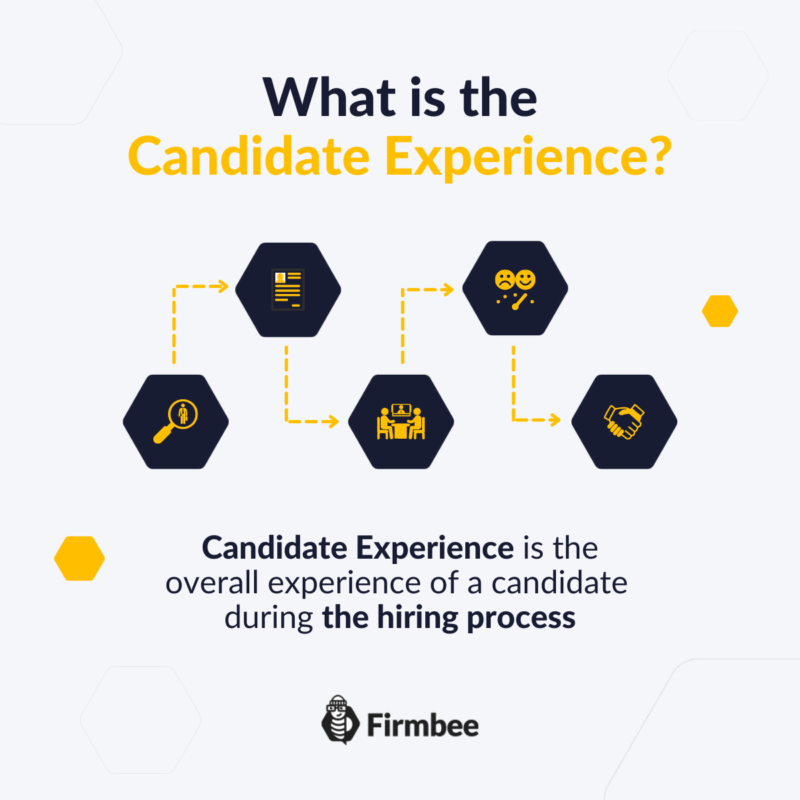Candidate Experience is the overall experience of a candidate during the recruitment process. Companies pay more attention to the candidate’s feelings during the recruitment process, which translates into his/her attitude and involvement in work after employment. With candidates who fall out at the recruitment stage, taking care of Candidate Experience the company will gain positive opinions and recommendations regarding the recruitment process and atmosphere in the company.
Candidate experience in recruitment – table of contents:
- Precise expectations
- Feedback
- Meeting deadlines
- An incentive to get to know the company?
- Getting to know your future workplace
- The atmosphere in the future workplace
- Respect and commitment
- Feedback from applicants
- Implementation of changes

Precise expectations
At the very beginning of the recruitment process – i.e. when writing the advertisement – consider how to make it easier for the candidate to apply. The ad should contain precise expectations, e.g. “we pay special attention to the following features of candidates: …”, “we require skills …”, “if you have experience in working on a similar position, please give examples of implemented solutions/projects in the area …”. This allows the candidate to know which of his/her skills or traits are valuable to the employer and which are worth including in the CV, and which responsibilities and experiences to describe in more detail to attract the recruiter’s interest.
There should also be other important information as a brief note about the company and the proposed position and responsibilities, the closing date for collecting applications and information about the recruitment process (e.g. whether the interview will take place remotely or at the company’s premises, whether there will be a recruitment task or test solution at a later stage). The more information in the advertisement, the better the candidate can get ready for the possible recruitment interview and will have fewer questions and doubts. The ad should also be legible, concise and understandable, and must not contain errors that may deter suitable candidates at the outset.
Feedback
A key aspect in the Candidate Experience is for the candidate to know about the process. They should receive detailed information about the recruitment process: how the whole process will look like, how many stages it consists of, how long it will last, when he can expect feedback, how, where and with whom the interviews will be conducted, and if the recruitment is conducted remotely – using what tools. It is also worth giving a brief summary after each stage of the recruitment process, including the end of the entire process. This will ensure that no candidate is left without answers. Knowing why they were not hired, can provide a valuable hint to what to improve in the future.
Meeting deadlines
Once you have communicated the deadline, do not exceed it. Otherwise, the candidate may change his or her opinion of the company and begin to perceive it as unreliable – which could weigh on the decision to work with you. In addition, good candidates have many opportunities in the market and may receive several other good offers in the two weeks between the interview and feedback. Therefore, it’s a good idea to not only meet the deadline but to keep it as short as possible and try to inform the candidate of the decision as soon as possible.
To facilitate the entire recruitment process and speed up certain issues use a dedicated ATS (Applicant Tracking System). It supports recruiters at every stage of recruitment – from reaching out to the right candidates to hiring the employee. You can learn more about it here.
An incentive to get to know the company
During the recruitment meeting, the recruiter should tell the candidate about the company, familiarize him/her with the work system, employment conditions, daily tasks, and the company’s mission and vision. Also, consider telling the candidate interesting facts about e.g. the company’s products or services. Then, you might encourage to take a look at the company’s social media or blog posts to learn more about the job and potential coworkers. Such a practice should not, however, be used instead of, but in addition to, the information provided by the recruiter about the company.
Getting to know your future workplace
If there is such a possibility, during the recruitment meeting it is good to show the candidate the future workplace – it can be at least a part of the office. To dispel all doubts, the recruiter can tell whether it is an open space or smaller rooms, whether there are comfortable, adjustable armchairs and what the employees have at their disposal. For the candidate, this accounts for additional information about the atmosphere at work and relationships between employees. Comfort at work plays an increasingly important role and may determine the decision to take a job.
The atmosphere in the future workplace
During a visit to a company’s headquarters for an interview, a candidate usually comes into contact with more people than just the recruiter. This could be a potential supervisor who also takes part in the interview, a receptionist who greets the candidate, or a potential coworker met in the hallway who directs the candidate to the meeting place. All of these people should welcome an unknown person to the company with a smile, thus showing the prevailing atmosphere among them.
Respect and commitment
The recruiter should show respect and interest in the candidate who has taken the time to come and present at the meeting. You should give him/her your full attention, listen to what he/she has to say and ask meaningful, constructive questions. You shouldn’t ask about things you can learn from reading the resume – the interview should be an extension of the resume, a supplement to it, and an opportunity to get to know the candidate.
Feedback from applicants
Feedback is worth collecting not only from the hired candidate but also from those who have not gone through all the stages of recruitment. This allows you to conduct an in-depth analysis of the process. The results of the research should be discussed in a wider circle – with all the people associated with the recruitment process to think together about the changes that the candidates would expect. At this stage, do some research at other employers and get inspired by Candidate Experience practices in their companies.
Implementation of changes
The end of the recruitment process is the time to work on the process – ask candidates to fill out a survey sent by email or answer a few questions over the phone about what they liked and what they didn’t like, what was incomprehensible and required additional explanation. The information from the applicants will help us improve the recruitment process, refine it and implement new solutions.
An interesting report on Candidate Experience was published by the Softgarden portal dedicated to recruiters – it contains opinions collected from a group of over 6000 candidates and their expectations regarding the recruitment process and information presented by the recruiter. Remembered that trends on the market and candidates’ requirements change quickly, therefore collecting feedback from candidates and implementing new solutions is the final stage of each recruitment process in a company.
Candidate experience in recruitment – FAQ
- What is the Candidate Experience?
- How to take care of Candidate Experience?
Candidate Experience is the overall experience of a candidate during the hiring process.
Keep candidates informed of the recruitment process, deadlines and decisions. Provide feedback after recruitment and collect feedback from candidates. Ensure continuous improvement of the process.
Read: How to recruit employees using Facebook? 4 ways to find the perfect candidate
If you like our content and you want to stay in touch – join our busy bees’ community!
Author: Nicole Mankin
HR manager with an excellent ability to build a positive atmosphere and create a valuable environment for employees. She loves to see the potential of talented people and mobilize them to develop.


















